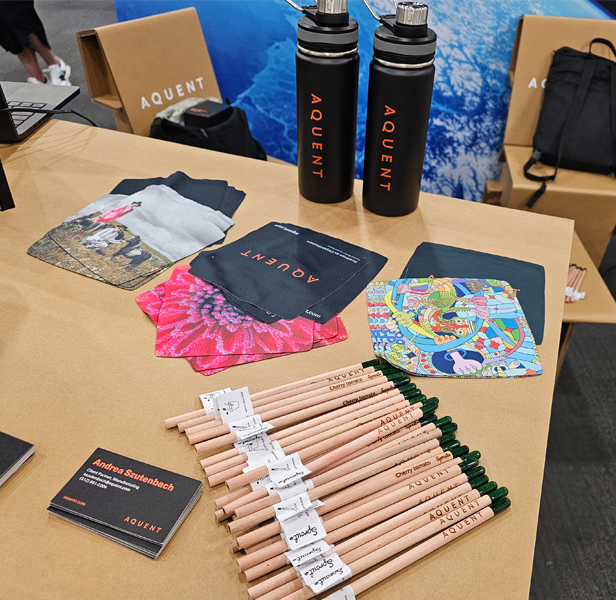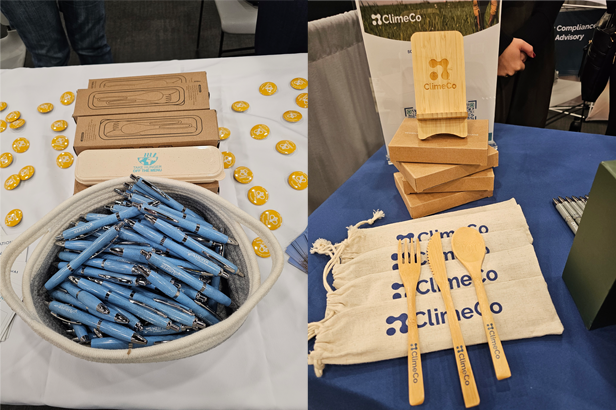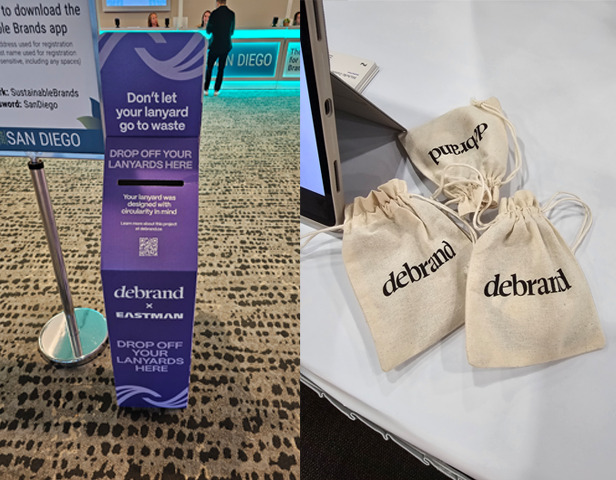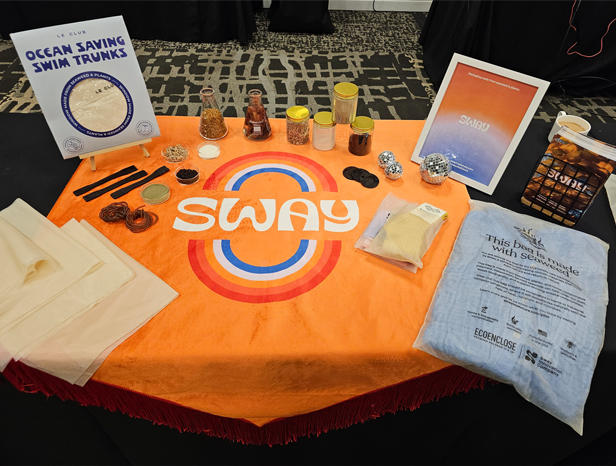Sustainability CANADIAN NEWS October 21, 2024
Sustainable Brands 2024: Innovation Through Collaboration
Held in San Diego, the conference, which attracts an array of nonprofits, well-known brands and others, focused on how to tackle waste and jump-start the circular economy.
Key Takeaways
• Collaboration for Sustainability: Breakthrough innovation and cross-industry collaboration are essential for fostering a circular economy and tackling climate change and plastic waste.
• Eco-Friendly Merch: The use of sustainable promotional products at Sustainable Brands demonstrates how marketing strategies can align with sustainability goals.
• Innovative Packaging Solutions like seaweed-derived compostable materials emphasize the need for diverse strategies to address plastic waste challenges.
Breakthrough innovation – paired with cross-industry collaboration – is key to creating a circular economy, tackling the climate crisis, eliminating single-use plastic waste and addressing other pressing sustainability issues. That was one of the overarching messages of Sustainable Brands 2024, held from Oct. 14-17 at the Town and Country Resort in San Diego, CA.
View this post on Instagram
Three-quarters of people around the world want to be seen as someone who buys and uses eco-friendly products, according to the 2024 Global Eco Pulse survey, shared by Suzanne Shelton, founder of ERM Shelton.
“The good news, when it comes to driving a circular economy, is that most people – 75% of them – want to be eco-friendly,” she said during a keynote at Sustainable Brands. “And 44% of people can even cough up examples unaided of when they have purchased, or not, from a brand because of their environmental or social record.”
However, she added, most consumers have a rather limited view of what it means to be eco-friendly – equating it mainly to recycling. “For 40 years, we’ve told people to recycle,” she said. “This is the mental model we’ve created.”
75%
the percentage of people globally who want to be seen as eco-friendly.(2024 Global Eco Pulse survey)
According to the Eco Pulse study, 84% of Americans agreed that recycling was the bare minimum they could do for the environment, and 76% said the concept of recycling made them feel better about their consumption habits. However, there’s a bit of a disconnect, since 32% of Americans aren’t confident that what they throw into the recycling bin actually gets recycled (a figure that has been on the rise, since back in 2019, when only 14% expressed that sentiment).
Also of note: The majority of Americans don’t know what the “circular economy” means, with only 30% understanding the term, which typically refers to eliminating waste and pollution, circulating products at their highest value for as long as possible and regenerating nature.
Shelton suggested that instead of using the phrase “circular economy,” brands can still accelerate the concept by leaning into words like “reduce” and “reuse” instead. She also provided details from a new circularity communications playbook created by a group of Sustainable Brands members highlighting 10 principles for communicating circularity, including making circular behaviors rewarding, convenient, and socially and culturally admired.
“Crucially, brands need to work together,” Shelton noted. “No one company should be on the hook for trying to move consumers to adopt circular products and services. Collaboration is key.”
She shared a case study where her company partnered with the Can Manufacturers Institute and canned food companies to tell the “infinite recyclability story of the steel food can.” Prior to their marketing campaign, only 3% of people believed that steel was the most likely material to get processed by a recycling center to become a new product. After the three-year-long collaborative “Canned Good” campaign, there was a 12% lift in the favorability of the steel food can and 11% lift in confidence that steel food cans get recycled, among other positive results, according to Shelton.
Where Does Branded Merch Fit In?
Although promotional products are often maligned as being wasteful, there was no shortage of branded merch at the Sustainable Brands conference, ranging from the logoed T-shirts and embroidered polos attendees wore as instant identification to the slew of eco-conscious giveaways stocking booths at the show’s innovation expo.

Work solutions company Aquent gave away plantable pencils, recycled polyester microfiber cloths and other sustainable promo.
One sterling example of well-deployed sustainable swag was work solutions company Aquent, which featured a booth decorated with a recyclable logoed cardboard table and couch from Chairigami. (The company’s triple-wall board is made in the USA from fiber certified by the Sustainable Forestry Initiative.) Aquent was giving out plantable pencils from Sprout USA (asi/88893) and microfiber cloths made from recycled polyester.
Other exhibitors offered reusable drinkware, utensils made of bamboo or wheat straw, notebooks made of recycled paper, packable grocery bags made of recycled polyester, repurposed cork coasters and wireless phone charging stands made of bamboo.

Companies exhibiting at the Sustainable Brands expo were careful to give out promo products that were eco-conscious.
Certified B Corp Fill it Forward (asi/54161), based in Guelph, ON, had a booth at the expo, showcasing its mission to help end single-use plastic bottle waste. The supplier was giving away its reusable Cupanion bottles (DR01) made of durable Tritan plastic, each of which include a QR code that can be scanned after each refill to contribute to giving projects around the world through the supplier’s app. The supplier also had QR stickers that could be affixed to an attendee’s personal tumbler to track refills and contribute to giving projects. After visiting the Fill it Forward booth, attendees could go to the adjacent FloWater booth and fill the bottle from one of FloWater’s purified water refill stations.
Bard College, touting its graduate programs in sustainability, offered tumblers from certified B Corp and 1% for the Planet member Klean Kanteen. The school was also giving away zipper pouches from recent B Corp and Counselor Top 40 supplier Gemline (asi/56070). Made from 70% recycled cotton and 30% recycled polyester, the pouches included Aware tracer technology, a blockchain-enabled verification of the products’ sustainable supply chain.

Debrand, which helps apparel and footwear companies recycle and reuse inventory, was a lanyard sponsor for Sustainable Brands, with drop boxes installed throughout the conference to ensure they would be reused at future events. The company also had a booth at the expo, explaining its services and giving away logoed sewing kits.
Debrand, a Canadian company that helps apparel and footwear brands give damaged, returned or unsellable inventory new life through resale, donation, recycling and repair, was mission-locked at Sustainable Brands, giving away logoed sewing kits at the conference. Debrand was also the event’s lanyard sponsor, and collection bins were stationed throughout the resort. At the end of the conference, attendees could deposit their lanyards so that Debrand could later sort them: Undamaged lanyards will be disinfected and reused at the 2025 Sustainable Brands conference, and damaged products will be recycled by Eastman, using its molecular recycling technology.
Tackling Packaging Waste With Seaweed Innovation
Attended by professionals at companies that included Amazon, Walmart, Procter & Gamble and Logitech, Sustainable Brands was packed with actionable information and food for thought. Among the many notable breakout sessions was a panel focused on the “seaweed economy mavens,” which outlined how Julia Marsh, co-founder and CEO of Sway, was able to develop a compostable, seaweed-derived packaging material, thanks to support from anti-plastic pollution nonprofit Lonely Whale, funding from Alante Capital and interest from Columbia Sportswear.

Sway makes compostable thin-film plastic from seaweed.
Thin-film plastic, often turned into polybags to protect apparel and other materials during shipping, is also a huge waste issue, with 11 million metric tons of the material ending up in the ocean each year, according to Emy Kane, managing director of Lonely Whale, which worked with designer Tom Ford to create the plastic innovation prize to help rapidly scale biologically degradable alternatives to traditional thin-film plastic.
“It’s a very annoying category of plastic that 100% of people hate,” said Marsh, whose company won the innovation prize. “People don’t like it. It makes them feel gross.”
Seaweed, which Marsh called “the most inherently generous material on Earth,” grows rapidly, creates ocean habitat and generates oxygen. Cultivated responsibly, through ocean farms, the plant can be used to make new sustainable materials, including plastic alternatives.
Marsh said Sway’s flexible seaweed-derived bags are durable enough to withstand battering during shipping, but they’re also designed to break down in less than 180 days through home composting and in less than 90 days in an industrial facility.
“We don’t want our materials to last forever,” she added. “We want them to complete the loop of biologic circularity.”
Sway has partnered with several fashion brands already to launch its seaweed-based polybags and expects to reach 20 metric tons of production by the end of the year, Marsh said.
“While recycling is improving, recycling at the scale needed to deal with plastic may never exist,” she said. Just as “nature is diverse,” she added, the solutions for dealing with plastic waste should be diverse too.
Dealing with packaging waste needs to be addressed by a coalition of brands, nonprofits, investors and innovators, according to the panelists. Without financial backing from investors and buying commitments from brands, entrepreneurs with new ideas likely won’t be able to scale their solutions, they explained.
“We’re firm believers in collaboration,” said Ellen Johnson, sustainability and innovation manager at Columbia Sportswear. “It’s so important for us to move the needle on sustainability.”

Promo for the Planet is your destination for the latest news, biggest trends and best ideas to help build a more sustainable and socially-responsible industry.
